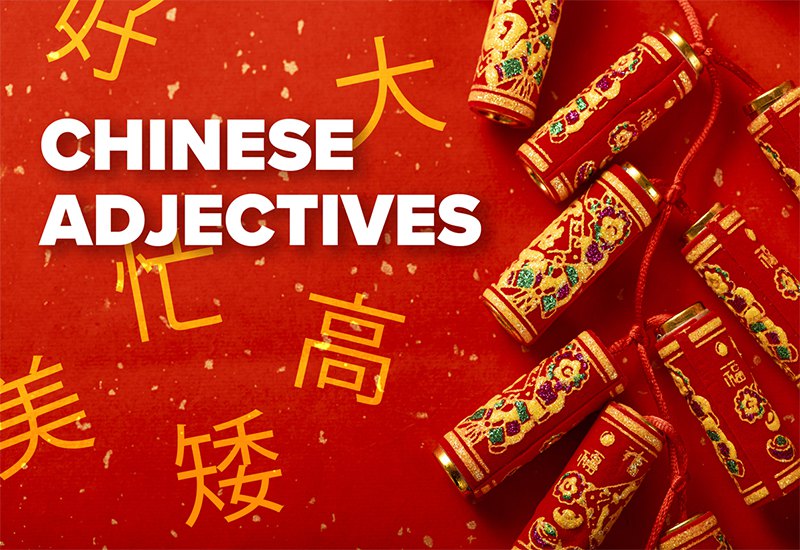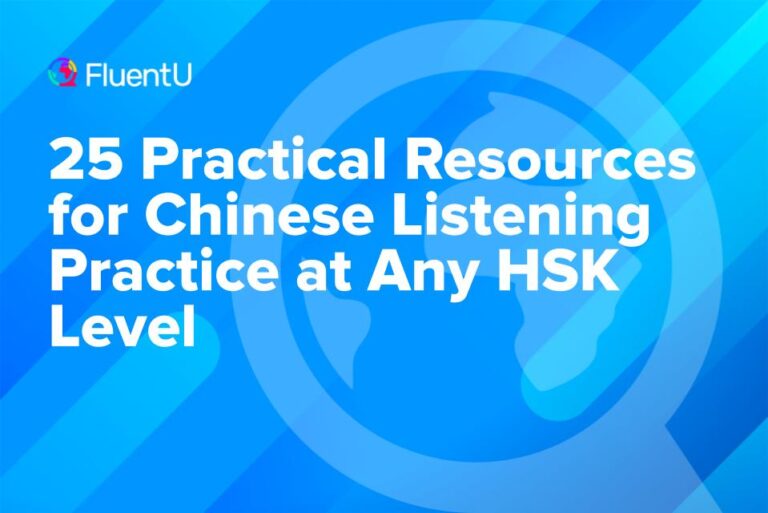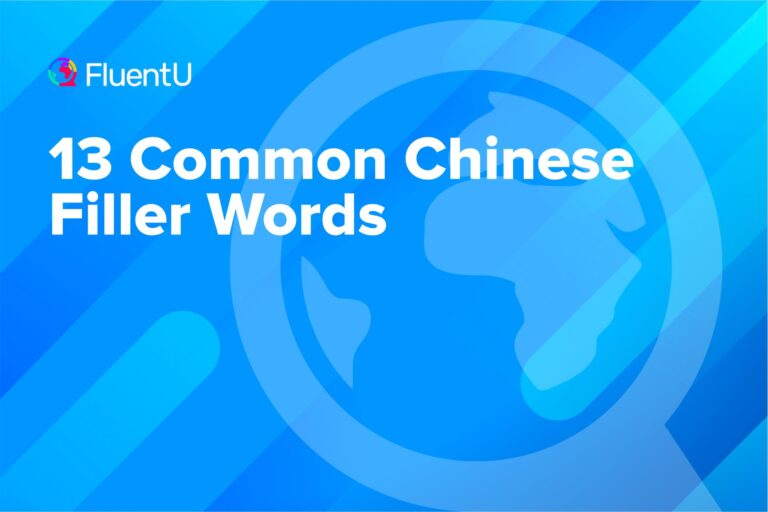The 50 Most Useful Chinese Adjectives for Everyday Conversation

Without adjectives, you won’t be able to describe anything.
When you’re learning Chinese, you’ll find it insanely difficult to communicate when simple, key adjectives are missing from your vocabulary.
So today, I’m here to teach you 50 of the most common Chinese adjectives you’ll hear (and use) all day every day.
Contents
- 1. 漂亮 (piào liang) — pretty
- 2. 好 (hǎo) — good
- 3. 不好 / 坏 (bù hǎo / huài) — bad
- 4. 美 (měi) — beautiful
- 5. 大 (dà) — big
- 6. 小 (xiǎo) — small
- 7. 胖 (pàng) — fat
- 8. 瘦 (shòu) — skinny/thin
- 9. 高 (gāo) — tall
- 10. 矮 (ǎi) — short (in height)
- 11. 长 (cháng) — long
- 12. 短 (duǎn) — short (in length)
- 13. 忙 (máng) — busy
- 14. 累 (lèi) — tired
- 15. 多 (duō) — many, a lot
- 16. 少 (shǎo) — few
- 17. 可爱 (kě ài) — cute
- 18. 好吃 (hǎo chī) — delicious
- 19. 难吃 (nán chī) — not delicious
- 20. 好玩 (hǎo wán) — fun
- 21. 有趣 (yǒu qù) — interesting, funny
- 22. 无聊 (wú liáo) — boring, bored
- 23. 快 (kuài) — fast
- 24. 慢 (màn) — slow
- 25. 容易 (róng yì) — easy
- 26. 难 (nán) — hard
- 27. 新 (xīn) — new
- 28. 老 (lǎo) — old
- 29. 聪明 (cōng míng) — smart
- 30. 远 (yuǎn) — far
- 31. 近 (jìn) — close
- 32. 便宜 (pián yi) — cheap
- 33. 贵 (guì) — expensive
- 34. 快乐 (kuài lè) — happy
- 35. 伤心 (shāng xīn) — sad
- 36. 有名 (yǒu míng) — famous
- 37. 内向 (nèi xiàng) — introverted
- 38. 外向 (wài xiàng) — extroverted/outgoing
- 39. 热 (rè) — hot
- 40. 冷 (lěng) — cold
- 41. 努力 (nǔ lì) — hard working
- 42. 懒 (lǎn) — lazy
- 43. 帅 (shuài) — handsome
- 44. 好看 (hǎo kàn) — good-looking
- 45. 难看 (nán kàn) — bad-looking, ugly
- 46. 甜 (tián) — sweet
- 47. 辣 (là) — spicy, hot
- 48. 酸 (suān) — sour
- 49. 干净 (gān jìng) — clean
- 50. 脏 (zāng) — dirty
- And One More Thing...
Download: This blog post is available as a convenient and portable PDF that you can take anywhere. Click here to get a copy. (Download)
1. 漂亮 (piào liang) — pretty
Like in English, Chinese has several ways to express that you find someone or something pleasing to the eyes. One of the most common choices is 漂亮.
我的妈妈很漂亮。
(Wǒ de mā ma hěn piào liang.)
My mom is so pretty.
2. 好 (hǎo) — good
好 can be used the same way the words “good” or “well” are used in English.
While 好 can be used by Chinese speakers to describe positive experiences, feelings, or things, it’s also commonly used in conjunction with other words to make new, logical meanings.
For example, you might recognize it from likely the first phrase you ever learned in Chinese: 你好 (nǐ hǎo). You already know this means “hello,” but it literally translates to “you good.” Interesting how language works, right?
他唱歌唱的非常好。
(Tā chàng gē chàng de fēi cháng hǎo.)
He sings very good/well.
3. 不好 / 坏 (bù hǎo / huài) — bad
Saying “bad” is quite simple in Mandarin—just say “not good!”
Or, opt for the word 坏.
今天的天气看起来不好。
(Jīn tiān de tiān qì kàn qǐ lái bù hǎo.)
Today’s weather looks bad.
她的脾气很坏。
(Tā de pí qì hěn huài.)
Her temper is very bad.
4. 美 (měi) — beautiful
Remember how we talked about the multiple ways to express attractiveness or beauty? Here’s another! Except, 美 is a bit stronger than 漂亮, similar to how “beautiful” is stronger than “pretty” in English.
这里的环境真美。
(Zhè li de huán jìng zhēn měi.)
The environment here is really beautiful.
5. 大 (dà) — big
To remember this Chinese word, many learners imagine the character as a stick figure holding his arms out to say, “It was this big!”
那个是最大的。
(Nà ge shì zuì dà de.)
That one is the biggest.
6. 小 (xiǎo) — small
As with 好, Chinese speakers use 小 to make many related words. For example, the word “snack” is 小吃 (xiǎo chī), which literally means “small eat.”
我的裙子太小了。
(Wǒ de qún zi tài xiǎo le.)
My dress is too small.
7. 胖 (pàng) — fat
This Chinese adjective might become useful after the holidays, like when you’ve eaten one too many 月饼 (yuè bǐng) — moon cakes during 中秋节 (zhōng qiū jié) — Mid-Autumn Festival.
我的小狗很胖。
(Wǒ de xiǎo gǒu hěn pàng.)
My puppy is fat.
8. 瘦 (shòu) — skinny/thin
The opposite of 胖 is 瘦. When I first learned this word, I remembered it by thinking, “If you want your muscles to 瘦 (shòu), you need to be thin.” Scientific truthfulness aside, it’s an easy mnemonic that worked for me.
你应该多吃一点,你太瘦了!
(Nǐ yīng gāi duō chī yì diǎn, nǐ tài shòu le!)
You should eat a bit more, you’re too skinny!
9. 高 (gāo) — tall
The Mandarin word for “tall” is 高, which looks like a tall building. It even has a roof on top!
我的男朋友很高。
(Wǒ de nán péng you hěn gāo.)
My boyfriend is very tall.
10. 矮 (ǎi) — short (in height)
我比她矮。
(Wǒ bǐ tā ǎi.)
I’m shorter than her.
11. 长 (cháng) — long
In Chinese, there are two ways to say “long,” but they have slightly different meanings. This one, 长 (cháng), refers to length. The other word, 久 (jiǔ), refers to time.
我比较喜欢长头发的女生。
(Wǒ bǐ jiào xǐ huān cháng tóu fa de nǚ shēng.)
I prefer girls with long hair.
12. 短 (duǎn) — short (in length)
Similar to the last adjective, 短 means “short” and refers to length while the adjective 矮 refers to height, as we learned earlier.
我妹妹的头发很短。
(Wǒ meì mei de tóu fa hěn duǎn.)
My little sister’s hair is very short.
13. 忙 (máng) — busy
Chinese speakers also use this as a way to say, “What’s up?” or “What have you been up to lately?”
你最近忙什么?
(Nǐ zuì jìn máng shén me?)
What’s up? / What have you been up to lately?
今天太忙了,我没有空。
(Jīn tiān tài máng le, wǒ méi yǒu kòng.)
Today is too busy, I don’t have free time.
14. 累 (lèi) — tired
I don’t know about you, but when I’m really tired, all I want to do is 累 (lèi) down.
他昨天工作到很晚,所以今天觉得很累。
(Tā zuó tiān gōng zuò dào hěn wǎn, suǒ yǐ jīn tiān jué de hěn leì.)
He worked late yesterday, so today (he) feels very tired.
15. 多 (duō) — many, a lot
多 is a powerful, multifaceted little word. It can be used as an adjective, a quantity and a question word.
You’ve probably heard it in phrases like “多少钱 (duō shǎo qián) — How much does it cost?” and “多长时间 (duō cháng shí jiān) — How long?”
But you can also use it when you want to say there’s a lot (or too much) of something, like in the example sentence below.
人太多了,我看不清楚。
(Rén tài duō le, wǒ kàn bù qīng chu.)
There are too many people, I can’t see clearly.
16. 少 (shǎo) — few
Like 多, 少 has a myriad of uses, making it a handy adjective to know. You can use it in combination with 多 to ask questions—like how much something costs (多少钱 — duō shǎo qián)—or to say there isn’t a lot or enough of something.
我的钱太少了,我买不起。
(Wǒ de qián tài shǎo le, wǒ mǎi bù qǐ.)
I have too little money, I can’t afford it.
17. 可爱 (kě ài) — cute
可 comes from the word 可以 (kě yǐ) which means “can” and 爱 (ài) means “love,” so if you translate it part-by-part, this adjective means “can love.”
所有的小狗都很可爱。
(Suǒ yǒu de xiǎo gǎo dōu hěn kě ài!)
All puppies are cute!
18. 好吃 (hǎo chī) — delicious
Remember how I said 好 can be combined with other words to make new adjectives? Well, this is one of them. 好吃 literally means “good eat.”
那个餐厅的饭很好吃。
(Nà ge cān tīng de fàn hěn hǎo chī.)
That restaurant’s food is delicious.
19. 难吃 (nán chī) — not delicious
难 means “hard” or “difficult,” so to say something doesn’t taste good, all you need to say is that it’s literally “hard to eat” with the word 难吃!
我做的饭很难吃。
(Wǒ zuò de fàn hěn nán chī.)
The food I cooked is very awful.
20. 好玩 (hǎo wán) — fun
Another 好 combination, the word for “fun” in Chinese literally means “good play.”
他是个很好玩的人。
(Tā shì gè hěn hǎo wán de rén.)
He is a fun person.
21. 有趣 (yǒu qù) — interesting, funny
There are two ways to say “interesting” in Mandarin: 有趣 and 有意思 (yǒu yì si). Textbooks usually teach 有意思 first, but in my opinion, you’re better off getting comfortable with 有趣.
Why? For one, it means both interesting and funny. Kill two birds with one stone by learning one word with two useful meanings.
And second, 有趣 just seems (in my personal experience) to be used more often by native speakers.
对我来说,历史是最有趣的科目。
(Duì wǒ lái shuō, lì shǐ shì zuì yǒu qù de kē mù.)
To me, history is the most interesting subject.
22. 无聊 (wú liáo) — boring, bored
Like many adjectives, 无聊 can be used to say that something/someone is boring or someone is bored. For example:
我不太喜欢那个电视剧,因为它太无聊了。
(Wǒ bú tài xǐ huān nà ge diàn shì jù. yīn wèi tā tài wú liáo le.)
I don’t really like that TV show, because it is too boring.
我在家待了一整天,感觉很无聊。
(Wǒ zài jiā dāi le yì zhěng tiān, gǎn jué hěn wú liáo.)
I stayed at home the whole day (and I) feel very bored.
23. 快 (kuài) — fast
I wish I had a clever mnemonic or interesting fact for this adjective, but the best I have is that 快 sounds similar to “quick.”
他跑步跑得那么快啊!
(Tā pǎo bù pǎo de nà me kuài a!)
He runs so fast!
24. 慢 (màn) — slow
I know several people whose pet peeve is a 慢 (màn) walking or driving too slow.
请说慢一点。
(Qǐng shuō màn yì diǎn.)
Please speak slower.
25. 容易 (róng yì) — easy
中文比英文容易。
(Zhōng wén bǐ yīng wén róng yì.)
Chinese is easier than English.
26. 难 (nán) — hard
First introduced with the adjective 难吃, 难 means “hard” or “difficult.”
你觉得学中文难吗?
(Nǐ jué de xué zhōng wén nán ma?)
Do you think learning Chinese is hard? / Do you find it difficult to learn Chinese?
27. 新 (xīn) — new
To me, 新 sounds like “shiny.” So when I hear it, I think of shiny new things.
这是我的新车 。
(Zhè shì wǒ de xīn chē.)
This is my new car.
28. 老 (lǎo) — old
Another multi-use word, 老 can describe someone or something’s age, but is also used in conjunction with other words to create new meanings (especially when denoting authority or superiority in status).
Take words like 老师 (lǎo shī) — teacher, 老公 (lǎo gōng) — husband and 老板 (lǎo bǎn) — boss as examples of this.
我很喜欢老房子。
(Wǒ hěn xǐ huan lǎo fáng zi.)
I really like old houses.
29. 聪明 (cōng míng) — smart
明, the last part of 聪明, literally means “bright.” This is helpful since “bright” can be used in English to mean smart or clever.
我的女儿很聪明。
(Wǒ de nǚ ér hěn cōng míng.)
My daughter is smart.
30. 远 (yuǎn) — far
This word is easy to mix up with 元 (yuán), the Chinese currency. Just remember that 远 has a third tone instead of a second!
You can remember this by imagining the dip in the third tone represents a valley, and the other side is far away.
你家离我的办公室很远。
(Nǐ jiā lí wǒ de bàn gōng shì hěn yuǎn.)
Your home/house is far from my office.
31. 近 (jìn) — close
The opposite of 远 is 近. Try using the mnemonic “Jean is close” to remember this one!
我住得很近。
(Wǒ zhù de hěn jìn.)
I live close by.
32. 便宜 (pián yi) — cheap
This adjective is one we all find useful! No matter how much 钱 (qián) — money you have, I’m willing to bet everyone here is a sucker for great deals.
这个商店有很多便宜的衣服。
(Zhè ge shāng diàn yǒu hěn duō pián yi de yī fu.)
This shop has a lot of cheap clothes.
33. 贵 (guì) — expensive
No matter how much haggling you might do, some things will just always be expensive. In this case, you might want to tell the shop owner or the street vendor that the item you’re looking at is just a tad over budget.
这件毛衣太贵了。
(Zhè jiàn máo yī tài guì le.)
This sweater is too expensive.
34. 快乐 (kuài lè) — happy
快乐 is helpful for describing emotions, but it’s also the word you use to wish someone a happy holiday—like in the phrase, 新年快乐!(xīn nián kuài lè!) — Happy New Year!
她觉得自己很快乐。
(Tā jué de zì jǐ hěn kuài lè.)
She thinks she is very happy.
35. 伤心 (shāng xīn) — sad
伤心 literally means “hurt heart.” Good luck trying to convince me there’s a more perfect way to describe sadness.
这是一部令人伤心的电影。
(Zhè shì yí bù lìng rén shāng xīn de diàn yǐng.)
This is a movie that is breaking people’s heart/This is a sad movie.
36. 有名 (yǒu míng) — famous
Hopefully, by now you’re starting to see that Chinese words have a lot of sense behind them. This one is no different. The word “famous” is 有名, which literally means “has name.”
我的朋友很有名。
(Wǒ de péng yǒu hěn yǒu míng.)
My friend is famous.
37. 内向 (nèi xiàng) — introverted
The word 内 means “inside, within,” and 向 means “orientation, direction.” So to say someone is introverted is like saying they’re inner-oriented. That sounds much cooler than our English version if you ask me!
她非常内向,不喜欢和人聊天。
(Tā fēi cháng nèi xiàng, bù xǐ huān hé rén liáo tiān.)
She’s very introverted and doesn’t like to chat with people.
38. 外向 (wài xiàng) — extroverted/outgoing
After learning 内向, you could probably guess what this adjective means just by looking at it. It means extroverted, which makes perfect sense once you realize that 外 means “outside.”
我的朋友很喜欢聚会,因为他是个外向的人。
(Wǒ de péng you hěn xǐ huān jù huì, yīn wèi tā shì ge wài xiàng de rén.)
My friend likes to party because he is an extroverted/outgoing person.
39. 热 (rè) — hot
All it takes to remember this Chinese adjective is thinking of the English phrase red-hot.
昨天晚上太热了,我睡不着觉。
(Zuó tiān wǎn shàng tài rè le, wǒ shuì bù zháo jiào.)
Last night was too hot, I couldn’t fall asleep.
40. 冷 (lěng) — cold
How should you remember this word? Breathing in cold air can make your 冷 (lěng)s hurt.
我现在很冷,因为我没有穿毛衣。
(Wǒ xiàn zài hěn lěng, yīn wèi wǒ méi yǒu chuān máo yī.)
I’m cold now because I don’t wear a sweater.
41. 努力 (nǔ lì) — hard working
By itself, 力 means “force” or “power.” When combined with 努, it becomes “hard-working”.
努力 is paired with a verb and depending on context, it can mean either to “do something hard” or “do something with effort.”
In the first example sentence, 努力 is used with the verb 学 (xué) to mean “study hard.” In the second, it’s simply used as an adjective to describe someone’s character.
我妈妈告诉我,如果你想找一份好工作,你就需要努力学习。
(Wǒ mā ma gào sù wǒ, rú guǒ nǐ xiǎng zhǎo yí fèn hǎo gōng zuò, nǐ jiù xū yào nǔ lì xué xí.)
My mom told me, if you want to find a good job, you need to study hard.
我想找一个很努力的男朋友。
(Wǒ xiǎng zhǎo yí gè hěn nǔ lì de nán péng yǒu.)
I want to find a hard-working boyfriend.
42. 懒 (lǎn) — lazy
This word might come in handy on the weekends when your friends want to go out but all you want to do is stay home to have a movie marathon on the couch.
我一到晚上就变得很懒。
(Wǒ yí dào wǎn shàng jiù biàn de hěn lǎn.)
When the evening comes, I become lazy/I become lazy at night.
43. 帅 (shuài) — handsome
You might hear this word in the phrase 帅哥美女 (shuài gē měi nǚ), which is used to describe a good-looking group of young people and literally means “handsome man beautiful woman.”
Even more common is just 帅哥 (shuài gē) by itself, which you’ll hear a lot if you fancy Chinese dramas. This is like the Chinese version of the Korean “oppa.” But in English, we’d usually just say “handsome/cute boy” or “a lady’s man.”
我的男朋友又聪明又帅。
(Wǒ de nán péng you yòu cōng míng yòu shuài.)
My boyfriend is both smart and handsome.
44. 好看 (hǎo kàn) — good-looking
And here we have another 好 combination adjective! Since the word 看 can mean “see, look, read or watch,” 好看 can be used the same way. Check out the examples to see how agile this adjective is.
你穿这个长裙好看。
(Nǐ chuān zhè ge cháng qún hǎo kàn.)
You look good in this dress.
这本书很好看。
(Zhè běn shū hěn hǎo kàn.)
This book is a good read.
这部电影很好看。
(Zhè bù diàn yǐng hěn hǎo kàn.)
This movie is a good watch.
45. 难看 (nán kàn) — bad-looking, ugly
Remember how 难吃 literally meant “hard to eat?” Well, bad-looking in Chinese is literally “hard to look at”: 难看.
那个颜色很难看。
(Nà ge yán sè hěn nán kàn.)
That color is ugly.
46. 甜 (tián) — sweet
这个蛋糕太甜了。
(Zhè ge dàn gāo tài tián le.)
This cake is too sweet.
47. 辣 (là) — spicy, hot
Spicy is one of those flavors you either love or hate. Either way, you’ll be using this word a lot when talking about food, especially if you visit 四川省 (sì chuān shěng) — Sichuan Province, which has long been known for its spicy cuisine.
我不太能吃辣的东西。
(Wǒ bú tài néng chī là de dōng xi.)
I can’t eat spicy things that much.
48. 酸 (suān) — sour
In my opinion, 酸 is the perfect pronunciation for a word that means “sour.” When your lips pucker up from sourness, repeating “suān” is a fool-proof way to straighten them back out.
你喜欢甜的食物还是酸的食物?
(Nǐ xǐ huan tián de shí wù hái shì suān de shí wù?)
Do you like sweet or sour food?
49. 干净 (gān jìng) — clean
干净 is both an adjective and a verb (meaning “to clean”)!
你的房间比我的房间干净。
(Nǐ de fáng jiān bǐ wǒ de fáng jiān gān jìng.)
Your room is cleaner than mine.
50. 脏 (zāng) — dirty
Last but not least, we have the opposite of 干净.
我弟弟的衣服总是很脏。
(Wǒ dì di de yī fu zǒng shì hěn zāng.)
My little brother’s clothes are always dirty.
Chinese adjectives are the perfect tools for adding flavor to your speech, sounding more like a native and getting one step closer to fluency.
While there are many more out there, learning these 50 will give you the solid foundation you need to memorize others. You can keep learning beyond this post of course, by looking for more adjectives in Chinese through programs like FluentU. FluentU takes authentic videos—like music videos, movie trailers, news and inspiring talks—and turns them into personalized language learning lessons. You can try FluentU for free for 2 weeks. Check out the website or download the iOS app or Android app. P.S. Click here to take advantage of our current sale! (Expires at the end of this month.)
I can almost guarantee that once you immerse yourself in Chinese—whether through travel or online Chinese media—you’ll hear these words 25/8!
If you want to continue learning Chinese with interactive and authentic Chinese content, then you'll love FluentU.
FluentU naturally eases you into learning Chinese language. Native Chinese content comes within reach, and you'll learn Chinese as it's spoken in real life.
FluentU has a wide range of contemporary videos—like dramas, TV shows, commercials and music videos.
FluentU brings these native Chinese videos within reach via interactive captions. You can tap on any word to instantly look it up. All words have carefully written definitions and examples that will help you understand how a word is used. Tap to add words you'd like to review to a vocab list.
FluentU's Learn Mode turns every video into a language learning lesson. You can always swipe left or right to see more examples for the word you're learning.
The best part is that FluentU always keeps track of your vocabulary. It customizes quizzes to focus on areas that need attention and reminds you when it’s time to review what you’ve learned. You have a 100% personalized experience.
Start using the FluentU website on your computer or tablet or, better yet, download the FluentU app from the iTunes or Google Play store. Click here to take advantage of our current sale! (Expires at the end of this month.)And One More Thing...











